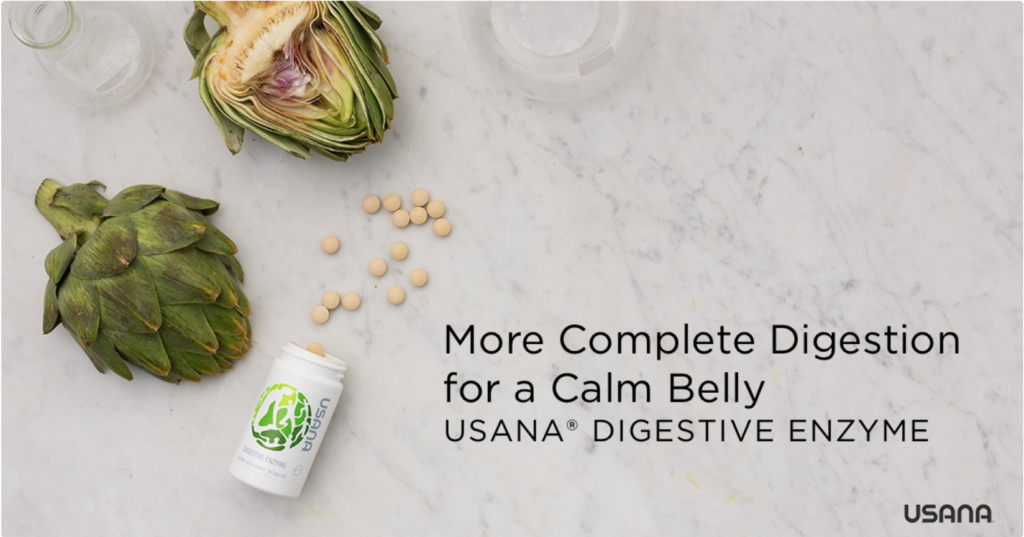
We all have experienced this discomfort of a bloated stomach at some point. Our clothes get tight, we feel heavy and fat. And that makes us feel self-conscious and embarrassed. Then all the negative self-talk starts making us feel absolutely awful about ourselves. If this happens on occasion, it is bad enough, but when it starts to become a frequent occurrence, we really feel crappy about ourselves.
How about you? Have you ever noticed that your tummy seems smaller in the morning and you feel pretty good? But, as the day goes on, your belly starts to expand. And by late afternoon or early evening you have a big bloated belly? So now you are thinking, “Seriously? What on earth is going on with this bloated stomach business every day? No matter what I eat, it seems I feel like a big bloated balloon by the end of the day!”
Digestive Enzymes – The Unsung Hero
Here’s the thing: everyone is focused on what they eat, but what about how they digest? Think about it for a minute – it doesn’t matter what you eat if your body does not break it down and digest it so it can be used by all your organs and tissues to do their job.
Digestive enzymes play a crucial role in that process. Some people have a general idea of what digestive enzymes are, but not many have considered the just how important they are and their role in our overall health.
So, what are digestive enzymes and what do they do?

Digestion doesn’t just take place in your stomach. Actually, it begins in your mouth where your salivary glands produce digestive enzymes. The pancreas produces a large portion of your digestive enzymes, as do the small intestine, stomach lining, and liver, and salivary glands. But these enzymes do not digest food -they digest nutrients.
Digestive enzymes are catalysts responsible for breaking down food to extract nutrients. They are then converted to:
- amino acids from proteins
- fatty acids and cholesterol from fats
- simple and complex sugars from carbohydrates
- and other vitamins, minerals, and compounds
This process is by no means a simple input-output. Dozens of different enzymes work together along the gastrointestinal (GI) tract to break down macronutrients from the foods you eat. These nutrients are then sent through the bloodstream to the liver and then are absorbed into the lymphatic system, which distributes them to tissues, organs, and muscles.
When you have normal, healthy enzyme function, your body digests meals efficiently, so nutrients can be absorbed and used by your body. It makes sense, because if your food is broken down fully, you’ll be more likely to get the most nutrition from what you eat.
As you can imagine, this complex exchange is responsible for the body’s access to fuel. But it doesn’t end there. Digestive enzymes affect factors for daily life that are not often considered.
Your bloated stomach is just one symptom

You can eat all the healthy food in the world, but if you can’t absorb it, not even the healthiest of diets will do any good. However, our bodies can only digest what it’s given. High-fiber foods such as fruits and vegetables contain enzymes of their own that work with digestive enzymes to break down foods faster and allow your body to access nutrients quickly for cell repair and growth.
Luckily, enzyme production is versatile and can be tailored to the composition of food consumed. However, if a diet doesn’t include this pairing of essential enzymes, or if the body is unable to produce enough enzymes to promote healthy digestion and diverse microbial life, you can run the risk of malnutrition and symptoms such as:
- Bloating
- Indigestion
- Constipation
- Thyroid issues
- Dull hair, skin, and nails
- Mood swings
- Depression
So your bloated stomach is only one of many other possible symptoms that can pop up because of a lack of digestive enzymes. Eating a healthy diet full of high-fibre foods, especially raw fruits and veggies is an important key support to enzyme production in your body.
Certain foods like pineapple, mango, papaya, and raw honey have been used in Central and South America for centuries to regulate digestion and inflammation in the GI tract. Fruits like raw bananas, mangoes, papaya, and pineapple supply enzymes. So do fermented foods like kefir or sauerkraut. These are great foods to include in your dietary plan.
I eat well…what else can I do?
Enzymes and Chronic Stress
Your bloated stomach could be your enzymes telling you to slow down. Chronic stress plagues many people these days. But just because we always seem to be on the go doesn’t mean our food needs to be. When we are eating on the go or feeling rushed or stressed, it limits the amount of enzymes our body can produce. This is partly because the brain attempts to eliminate stressors before it can reengage in normal functions-like digestion.
This is a helpful reminder to slow down.
When we can’t digest our food, we can’t provide our bodies with nutrients. Recurring bouts of anxiety can lead to indigestion and even pesky habits like comfort eating and snacking. As obesity levels skyrocket, it is easy to see how a simple change like sitting down for meals could provide a fulfilling way to destress and allow our enzymes to break down those nutrients that will fuel us on our way.
Digestive Enzyme Supplements
Your natural digestive enzyme production can slow down as you age. This could cause you to experience occasional episodes of mild bloating, gas, or discomfort after eating certain foods or large meals. A plant-based supplement can help bridge any enzyme gaps to provide additional digestive support.
Digestive enzyme supplements are widely available, though cheaper doesn’t always mean better. Make sure to check for quality ingredients that leave out fillers that could denature the enzymes.
Plant-based digestive enzymes primarily help support a healthy digestive system by lightening the load on your pancreatic and liver enzymes by helping to “pre-digest” your food. They work along with stomach acid to begin breaking down your meal before the food moves on to your intestines, where your natural pancreatic enzymes take over. Some of the plant-based enzymes may remain active beyond the stomach to support digestion throughout the process.

I recommend USANA’s Digestive Enzyme to bolster your body’s natural enzymes and promote optimal digestive efficiency. The Natural Enzyme Blend supplies a wide range of plant-based enzymes that support normal, healthy digestion and absorption of the different types of macronutrients:
- Amylase: breaks down starch
- Bromelain: breaks down protein
- Cellulase: breaks down cellulose (usually comes from plant material like fruits and vegetables)
- Lactase: breaks down lactose (milk proteins)
- Lipase: breaks down fat
- Papain: breaks down protein
- Protease: breaks down protein
USANA Digestive Enzyme also offers an extra boost of support for healthy digestion with artichoke extract (Cynara scolymus L.). The active phytonutrient from artichoke leaves has been shown to help relieve digestive complaints, like mild stomach upset, by aiding the digestion of fatty foods, especially after a large meal.
Disclaimer: These statements have not been evaluated by the Food and Drug Administration. These products are not intended to diagnose, treat, cure, or prevent any disease.

Leave a Reply